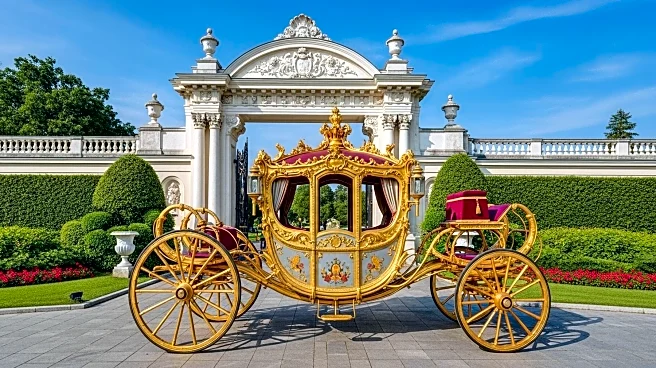What's Happening?
President Trump is scheduled for a second state visit to the United Kingdom, where he will be hosted by the royal family from September 16 to 18. The visit will include a lavish banquet and a carriage procession, marking a significant difference from his first visit in June 2019. The President and First Lady Melania Trump will be greeted by America's ambassador to Britain and escorted to Windsor Castle by Prince William and Princess Catherine. They will meet King Charles and Queen Camilla, followed by a royal salute and a carriage procession through the Windsor estate. The Princess of Wales is expected to play a more significant role during this visit, undertaking a joint engagement with the First Lady. The visit will also include a private wreath-laying ceremony at the tomb of Queen Elizabeth II in St George's Chapel, Windsor.
Why It's Important?
This visit underscores the continued diplomatic relations between the United States and the United Kingdom, highlighting the importance of international alliances. The royal family's elaborate welcome signifies the value placed on the relationship with the U.S., potentially influencing future diplomatic and trade discussions. The involvement of high-profile figures from both countries at the banquet could foster stronger bilateral ties. Additionally, the visit provides an opportunity for President Trump to pay respects to the late Queen Elizabeth II, reinforcing historical connections and mutual respect between the nations.
What's Next?
Following the state visit, President Trump is expected to meet with UK Prime Minister Keir Starmer. Although the UK parliament is in recess, this meeting could set the stage for future discussions on policy and international cooperation. The visit may also prompt reactions from political leaders and civil society groups, potentially influencing public opinion and diplomatic strategies.
Beyond the Headlines
The visit may have deeper implications for U.S.-UK relations, particularly in terms of cultural diplomacy and the role of the royal family in international affairs. The emphasis on ceremonial aspects could reflect broader cultural exchanges and the soft power dynamics between the two nations. Long-term shifts in diplomatic strategies may be influenced by the outcomes of this visit.










